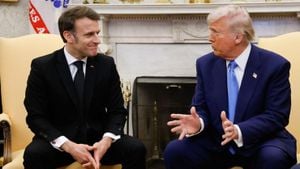The Ongoing Israeli-Palestinian conflict once again stirred reactions after controversial remarks made by sports journalist and Bnei Sakhnin broadcaster Said Hassanine. During an interview aired on Israel's Channel 14, Hassanine made comments praising Hamas and expressing his disdain for Arab citizens of Israel who enlist in the Israeli Defense Forces, igniting widespread backlash.
Hassanine's statements came to light when he addressed the condition of Omer Shimtov, an Israeli soldier who had been kidnapped. He remarked, "This reflects his appreciation and respect for what they did for him," citing Shimtov's actions during his release, where he allegedly expressed gratitude to his captors. Such remarks provoked outrage, as they were taken to imply Hassanine's support for Hamas, the organization recognized as terrorist by many nations, including Israel.
He continued to criticize Arab citizens who join the Israeli military, saying, "There are weak souls who join the army and serve the enemy. Hamas wanted to send a message to Palestinians inside Israel…" These comments quickly escalated across social media platforms and received polarized feedback from the public and political figures alike.
Miki Zohar, Israel's Minister of Culture and Sports, was among the notable political figures who condemned Hassanine's statements, demanding immediate expulsion from his position. Zohar stated firmly, "We cannot allow such matters to come from within, or we will not be able to mend the rift in Israeli society." His assertion reflects the sensitivity surrounding issues of national identity and loyalty among the Arab population within Israeli society.
Following Zohar’s remarks, Erez Khalfon, the head of the Israeli Premier League, communicated his concerns, labeling Hassanine's comments as "dangerous, false, and unacceptable." Khalfon emphasized the need for Sports Clubs to take action against representatives whose actions could harm community relations.
Hassanine's home club, Bnei Sakhnin, responded to the uproar by announcing they would hold listening sessions to address the matter directly with Hassanine. While they claimed his statements were taken out of their original intent, the club insisted on respecting the outrage expressed by the public.
Eventually, following internal discussions, Bnei Sakhnin announced Hassanine would terminate his broadcasting duties voluntarily. This decision was not only seen as protective of the club's image but also, as many argued, as implicit acknowledgment of the weight and risks of inflammatory political speech within the fabric of Israeli society.
The cultural dynamics of sports journalism often intersect with societal tensions, highlighting the nuances of identity among Arab citizens of Israel. Hasan's comments and the uproar they caused reflect deep-seated issues, echoing broader sentiments often overlooked by mainstream narratives. The reactions of officials also underscored the importance leaders place on promoting cohesion within Israel's diverse population.
While the conversation remains heated, the incident illuminates the underlying tensions faced by Arab citizens serving within the military and the backlash they may experience not only from the Jewish majority but also from their community. It raises important questions about patriotism, identity, and the struggle for recognition and belonging within Israel’s complex societal mosaic.
This controversial episode serves as both a reminder and amplifying lens on the already fraught relationships and perspectives held by various communities across Israel. Each remark carries the potential to ignite change, incite debate, and send ripples across the broader narrative surrounding the Israeli-Palestinian conflict.



